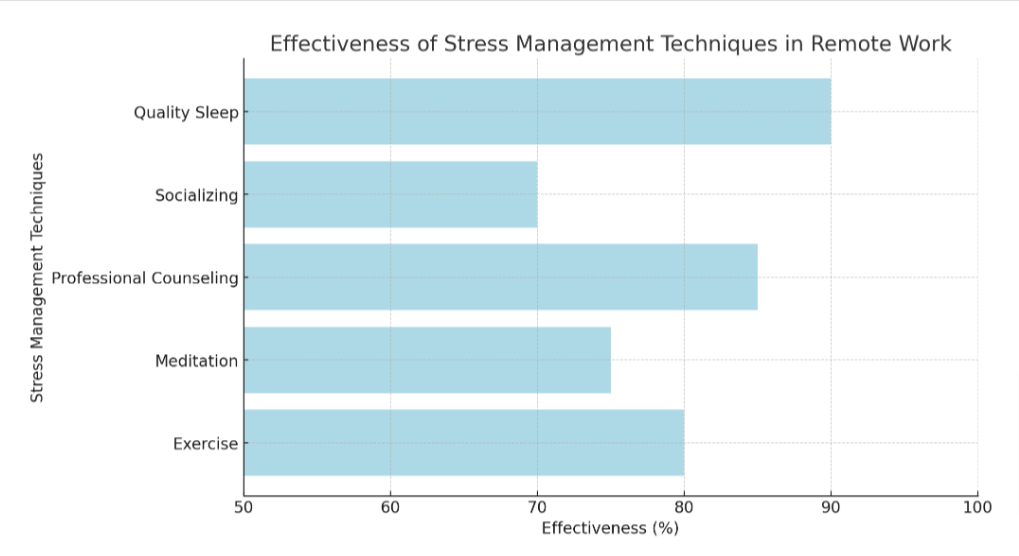Mastering Stress Management in Remote Work Environments
As remote work becomes the norm, stress can sneak into our home offices. A staggering 41% of remote workers report high stress levels, according to a United Nations study. This article lays out practical strategies to manage that stress and keep you productive and at ease from your home workspace.
Dive in for peace of mind!
Key Takeaways
- Create a structured daily routine with consistent work hours and breaks to help your brain know when it’s time for work and relaxation.
- Set clear boundaries between work and personal life, turn off your computer at the end of the day, and avoid overworking to maintain mental wellness.
- Use digital tools to track productivity transparently, set achievable goals, and provide updates which encourages accountability in remote work settings.
- Limit information intake by choosing reliable sources and dedicated times for news consumption to prevent stress from information overload.
- Foster open communication within teams through regular check – ins, empathetic listening, and providing support to promote a positive remote working culture.
Identifying and Managing Work-From-Home Stress
Prioritizing mental health is essential in managing work-from-home stress. Setting boundaries, establishing a daily routine, and transparently tracking progress are effective strategies for reducing stress while working remotely.
Prioritizing mental health
Taking care of your mental health is just as vital as meeting deadlines and hitting targets. While working remotely, it’s crucial to listen to what your mind needs. This might mean stepping away from the desk for a short walk or setting aside time for meditation each morning.
Stress relief techniques such as deep breathing exercises can be seamlessly integrated into your daily routine, helping you stay focused and energized throughout the day.
Make sure to communicate with your team about how you’re feeling — sharing any stressors can lead to a supportive work environment where everyone prioritizes mental wellness. Balancing work and personal life becomes more attainable when mental health isn’t an afterthought but a central aspect of remote work productivity.
Engaging in regular physical activity, seeking professional help when needed, and ensuring quality sleep are other effective strategies that contribute greatly towards maintaining good mental health while mastering the challenges of remote work.
Setting boundaries and reducing perfectionism
Setting clear boundaries is a powerful stress management tool in remote work. Decide on specific hours for work and stick to them, shutting down your computer when the day ends. This helps separate your professional tasks from personal time, allowing you to recharge and maintain better work-life balance.
Define what’s “good enough” for each task and resist the urge to over-polish every detail. Perfectionism can lead to burnout; instead, aim for high quality within reasonable limits.
Embrace the idea that mistakes are part of learning and growth rather than signs of failure. Communicate openly with coworkers about realistic expectations for projects, which can alleviate pressure on everyone involved.
Know when to delegate or ask for help instead of taking on too much by yourself. By reducing perfectionist tendencies, you allow more space for creativity and innovation in your workflow while keeping stress at bay.
Establishing a daily routine
Creating a structured routine is crucial for managing stress in remote work. A well-planned day can boost productivity and help maintain mental wellness.
- Decide on consistent work hours to start and end your day, just like you would in an office setting. This signals your brain when it’s time to focus and when to unwind.
- Allocate specific times for breaks throughout the day. Regular pauses can refresh your mind and prevent burnout.
- Dedicate a workspace that’s separate from personal areas. This helps create a physical boundary between work life and home life.
- Outline your top priorities each morning. Knowing what tasks need attention sets the tone for a productive day.
- Include exercise or physical activity in your routine. Movement relieves tension and increases energy levels.
- Plan mealtimes away from your desk. Eating separately from where you work can reduce stress by giving you a change of scenery and a mental break.
- Schedule regular check – ins with team members if you’re part of a group. These can keep communication open and help distribute the workload evenly.
- Make time at the end of the day for reflection on what you’ve accomplished. Acknowledging progress daily can foster a sense of achievement and satisfaction.
- Prepare for the next day before logging off. Setting up tomorrow’s to – do list helps clear your mind and makes starting the next morning smoother.
Tracking progress transparently
Remote workers can transparently track their progress by setting clear daily or weekly goals and using digital tools to monitor their productivity. Team members can share regular updates through collaborative platforms, providing visibility into individual contributions and overall project advancement.
This fosters accountability and allows for timely adjustments to ensure that work stays on track and deadlines are met.
By tracking progress transparently, remote workers can effectively manage their time, optimize productivity, and maintain a sense of accomplishment throughout the workweek. This approach also promotes transparency within the team, ensuring that everyone is aligned with project milestones and deliverables.
Limiting information intake
To manage stress while working remotely, limiting information intake is crucial. Filter news and reduce exposure to negativity by selecting reliable sources for updates on work-related or world events.
Prioritize self-care and allocate specific times to catch up with the news to prevent overwhelming yourself. By doing so, you can maintain a healthy balance between staying informed and avoiding information overload.
In addition, creating clear boundaries around your information consumption helps in maintaining mental well-being. For instance, setting aside time for non-work-related activities without any digital distractions can significantly reduce stress levels.
Strategies for Promoting Remote Work Mental Health
Prioritizing self-care and setting clear expectations for work progress are essential in promoting mental wellness while working remotely. By cultivating open communication and understanding, remote workers can create a structured routine that limits exposure to negativity, ultimately leading to a healthier work environment.
Prioritizing self-care
- Dedicate time each day for activities that promote relaxation and rejuvenation, such as exercise, meditation, or hobbies.
- Make healthy eating and hydration a priority to support overall well – being and energy levels throughout the workday.
- Set clear boundaries between work and personal time by creating a designated workspace and establishing specific work hours.
- Take regular breaks during the workday to rest your mind and prevent burnout, even if it’s just a short walk or stretching.
- Seek social connections outside of work to maintain a balanced social life, whether through virtual hangouts or safe in-person interactions.
Cultivating open communication and understanding
To promote mental wellness while working remotely, it is essential to cultivate open communication and understanding within your team. This can be achieved by:
- Actively listening to your colleagues’ concerns and offering empathy and support.
- Holding regular check – ins or virtual meetings to encourage open dialogue and address any challenges.
- Creating a safe space for team members to share their thoughts and feelings without fear of judgment or repercussion.
- Encouraging collaboration and fostering a culture of mutual respect and appreciation for diverse perspectives.
- Providing avenues for constructive feedback and addressing any conflicts or misunderstandings promptly.
Creating a structured routine
Cultivating open communication and understanding sets the foundation for effective remote work mental health. Establishing a structured routine is equally crucial in managing stress and maintaining productivity. Here are effective ways to create a structured routine:
- Start the day with a consistent morning routine, such as exercising or meditation, to set a positive tone.
- Plan and prioritize tasks by creating a detailed daily schedule, allowing for breaks and flexibility.
- Designate a dedicated workspace that is free from distractions to aid focus and separation of work from personal life.
- Set specific start and end times for work to maintain boundaries and prevent overworking.
- Incorporate regular short breaks to rest and recharge throughout the day.
Setting clear expectations for work progress
To promote effective remote work progress, ensure clear expectations are established for tasks and deliverables.
- Clearly define project deadlines, goals, and expected outcomes to avoid confusion and miscommunication.
- Regularly communicate with team members to provide updates on individual and collective progress.
- Encourage open dialogue regarding workload, timelines, and potential challenges to ensure everyone is on the same page.
- Utilize project management tools or software to track tasks, timelines, and milestones for greater transparency.
- Establish regular check – in meetings or progress reviews to address any issues and adjust expectations if necessary.
Limiting exposure to negativity
To maintain a positive mindset and reduce stress while working remotely, it’s essential to limit exposure to negativity. Here are some effective strategies for achieving this:
- Minimize time spent on social media and news consumption to avoid overwhelming negativity.
- Surround yourself with positive influences by connecting with supportive colleagues and friends online.
- Practice gratitude daily to shift your focus away from negative thoughts and emotions.
- Engage in activities that bring joy and positivity into your life, such as hobbies or exercise.
- Set boundaries with individuals who consistently exhibit negative behavior to protect your mental well-being.
Tips for Supporting Mental Health of Remote Coworkers
Encouraging self-care and fostering open and understanding communication are essential for supporting the mental health of remote coworkers. Providing resources for employee well-being and maintaining a positive and inclusive work culture can also make a significant impact on their overall well-being.
Encouraging self-care
Encouraging self-care is crucial for managing stress in remote work. Here are effective ways to promote self-care:
- Carve out dedicated time for relaxation and hobbies to decompress from work stress.
- Prioritize regular exercise to boost mood, reduce stress, and improve overall well – being.
- Practice mindfulness and meditation techniques to stay grounded and reduce anxiety.
- Set boundaries between work and personal life by defining specific off – duty hours and sticking to them.
- Ensure adequate sleep by establishing a consistent bedtime routine and creating a restful sleep environment.
- Seek social support through virtual connections with friends and family members to foster a sense of community.
- Take breaks throughout the workday to recharge, step away from screens, and engage in rejuvenating activities.
Fostering open and understanding communication
Cultivating a supportive work environment involves fostering open and understanding communication. This can be achieved by:
- Actively listening to colleagues during virtual meetings, showing empathy, and acknowledging their perspectives.
- Encouraging team members to express their concerns and providing a safe space for open dialogue.
- Clearly communicating expectations and goals to avoid misunderstandings.
- Using inclusive language and promoting a culture of respect and appreciation for diverse viewpoints.
- Implementing regular check-ins to inquire about well-being and offering support when needed.
Offering support for work progress
It is important to offer support for work progress in a remote work environment. This can be achieved by:
- Regular check – ins with team members to assess their workload and provide assistance where needed.
- Providing constructive feedback and resources to help team members meet their goals.
- Encouraging collaboration and sharing of best practices to enhance productivity.
- Recognizing and celebrating achievements to boost morale and motivation.
- Ensuring open channels of communication for addressing any obstacles or challenges that may arise in completing tasks.
Maintaining a positive and inclusive work culture
Promoting a supportive and inclusive work environment is crucial for remote teams to thrive. Here are some strategies to maintain a positive and inclusive work culture:
- Encourage regular team check – ins to foster camaraderie and build strong relationships among remote colleagues.
- Recognize and celebrate individual and team achievements to boost morale and create a sense of appreciation.
- Emphasize diversity and inclusion through training, policies, and practices, ensuring all employees feel valued and respected.
- Facilitate open discussions about challenges, successes, and ideas, promoting transparency and collaborative problem-solving.
- Implement initiatives that promote work-life balance, such as flexible schedules or mental health days, to support overall well-being.
Providing resources for employee well-being
To support the well-being of remote employees, it is essential to provide them with access to resources that can help improve their mental health and overall wellness.
- Employee Assistance Programs (EAPs): These programs offer confidential counseling and referral services to assist employees facing personal or work-related challenges. EAPs can provide support for stress management, depression, anxiety, and other mental health concerns.
- Wellness Workshops and Webinars: Hosting virtual workshops and webinars on topics such as mindfulness, resilience, time management, and work-life balance can equip remote workers with practical strategies for reducing stress and enhancing their well-being.
- Access to Mental Health Apps: Providing access to mental health apps that offer meditation exercises, mood tracking tools, relaxation techniques, and self-help resources can empower employees to proactively manage their stress levels.
- Flexible Work Arrangements: Offering flexible work schedules or the option for compressed workweeks can give employees the flexibility they need to attend medical appointments, prioritize self-care activities, or manage personal commitments without feeling overwhelmed by their workload.
- Virtual Wellness Challenges: Organizing virtual fitness challenges or wellness initiatives within the remote team can promote physical activity, healthy eating habits, and social connection while fostering a supportive community culture.

Conclusion
In conclusion, balancing work and personal well-being is crucial for remote workers. Prioritizing mental health, setting boundaries, and establishing a daily routine are key strategies to manage stress effectively.
Encouraging self-care and maintaining open communication can further promote mental wellness in a remote work environment. Supporting coworkers through positive communication, understanding their progress, and fostering an inclusive work culture are vital for collective well-being in the virtual workspace.

